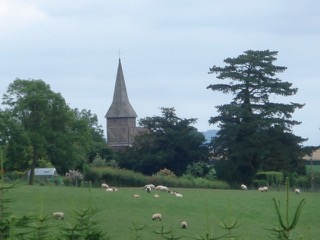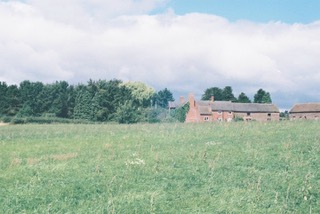
The hearse stopped at the crossroads – two lanes folded like ribbons. It was left or right to either end of the hamlet. The left lane led to the church, now decommissioned, while the right made its way to the family farm.
‘Why has it stopped?’ I asked from the back seat.
There was a brief pause. My mother said: ‘They’re giving him one last look.’ And then the hearse turned left towards the graveyard.
***
My grandfather died in the spring of 2018. It was his wish to be buried in the hamlet, despite the church now being vacant. My grandmother already lay there waiting for him in the churchyard. Thinking back on his funeral, there’s something symbolic about them both being at peace in the graveyard of a decommissioned church, because it felt as though something else was being buried alongside my grandfather that day.
I begin with my grandfather because, in one sense, that’s where the story of my family farm begins. He hailed from Luton, where his father worked for the Inland Revenue. During the Second World War, when my grandfather was a teenager, students were encouraged to help out on local farms in the evenings and holidays. After getting a taste for farming, he told his parents that he would like to leave school and work on a farm, and, with some trepidation, they agreed to it.
Through a contact at the local tax office, he was sent to a farm on the Herefordshire/Worcestershire border. To get there, he cycled across London in the Blitz, only just making the train at Paddington. When he reached the nearest local station, he cycled seven miles to the farm – without any luggage, for he’d had to leave it behind – and when he finally arrived, he was put to work straight away pitching corn. They didn’t allow him to collect his luggage for days, as they only went to town for supplies once a week.
Once he’d set foot in the parish, my grandfather never really left. He ended up marrying the niece of the tenant bachelor, and together they went on to buy the farm and raise two sons, one of whom, my father – now in his seventies – still lives in the same house and farms the same patch of land.
***

Whenever you live anywhere for a long time you can guarantee that it will change, but I’ve come to believe that the vacant church is a symbol for the way the countryside has changed both for my family and possibly for others too. What was once the religious centre of the community and local life is now purely a memorial. There are times, however, when it feels as though an era is passing in a single day. This was precisely the feeling I had at my grandfather’s funeral in the springtime of 2018.
As the parish church was no longer in use, the funeral took place in the town in which he’d arrived off the train all those years ago. My grandfather was a popular local figure who had reached a ripe old age, so the service was more of a celebration than a lament. At one point, a musician playing an accordion gave a rendition of the song ‘The Farmer’s Boy’, which tells the tale of young outsider inheriting the farm he works on, and we all joined in during the chorus.
‘To plough and sow, to reap and mow
And to be a farmer’s boy,
To be a farmer’s boy.’
The church was packed, and it was standing room only towards the back. The entire town was there, or so it felt to me. My grandfather may have started out as an outsider, but he was deeply embedded in his community and made countless friends at the various country pubs in the surrounding area. And there they all were, the ones who’d survived him, clapping him out of the church.
***
There’s more to say about my grandfather, but even this brief glimpse of his life illustrates a connection to place and community that’s rare today and getting rarer. As I sang along to ‘The Farmer’s Boy’ during the service I couldn’t help but be aware that my life has taken a different path. To be a farmer’s son or daughter today comes with a different set of challenges. Add to these any writing ambitions and there is even more to negotiate, emotionally as well as practically.

In a previous blog post in this series, the writer and farmer Patrick Laurie explains how when poets such as Ted Hughes and Seamus Heaney – the one a farmer, the other a farmer’s son – wrote about farming the context of the mid/late twentieth century, their readers ‘recognised something of their own lives in descriptions of scythes and milk churns’, and how, ‘nowadays, […]it’s often harder to find common ground with readers who might have zero experience of the countryside.’
Scythes and milk churns aside, in today’s urban world, descriptions of rural life risk coming across as nostalgic and out of date. But for me and others who share a similar background, such imagery is as potent and relevant as it was fifty years ago. Growing up on a farm, there’s sometimes the sense that the tools of everyday life, pitchforks and buckets, for example, have become a cliché or a trope. Yet despite the high-tech nature of farms these days, such items still hold practical as well as sentimental value.
Ever since my grandfather’s funeral, I’ve been thinking about how to communicate this predicament, not only for the purpose of connecting with an audience but also to understand my own place in the world. It’s easy to get the impression that rural communities such as the one in which I grew up are as marginal now as they have ever been. Despite this, I still believe that stories such as my grandfather’s are worth telling, if not for their universality, then for their specificity.
Laurie’s right when he says that nature writing has a role to play in both educating and connecting farmers with the wider public. He’s also correct when he says that its important that farmers ‘look out at the world as human beings’. I would add to this that it’s equally as important for writers and readers to remember the personal side of farming. Each and every farming family in the countryside has their own story to tell, and while the responsibility that farmers have for the natural world is an increasingly pressing subject, it’s also crucial not to lose sight of their individuality. In this sense, nature writing inevitably includes writing on the nature of being a person in the landscape and all that entails.
***
‘But the lad that now a farmer is,
He oft times smiles with joy
When he thinks of the day that he came this way
All for to seek employ’
As it made its way to the hamlet and the vacant churchyard, the hearse followed the same route my grandfather had taken on the day he’d first set foot in the parish. That cycle ride to the farm all those years ago would come to be the journey to his final resting place. At the churchyard, we each tossed some soil onto the coffin. It’s a significant moment for any family, but my grandfather’s relationship with the land added yet another layer to the act.
These are my first tentative written thoughts regarding my grandfather’s funeral, which I often think back to at this time of year. When I mention his story to friends and when I discuss my farming background more generally, a common reaction is that it must be great material for writing. My grandfather himself was a storyteller and was full of tales about his life on the farm. But to write about or fictionalise events when those events are recent is easier said than done, especially when the ripples are still being felt. The farm is a great source of inspiration for me, but its life is ongoing, and I can’t help but feel a sense of responsibility for how it’s represented to others.
Ted Hughes once wrote that ‘writing & farming mix like motor engines & gelignite’, and while there’s some truth to his complaint (trying to balance the two can be difficult, nearly impossible) there’s also a sense that the two lifestyles, properly managed, can fuel each other. Writing about farming is so much more difficult, and yet is more valuable, when the writer has a stake in a particular farm and a local environment. I have a great amount of respect anyone who’s able to pursue both artforms and make it work.
Speaking as someone who nowadays is more of a writer than a farmer but remains connected to the land via my family, I often find it difficult to see the wood from the trees when it comes to our own farm and literary representations of farming. I may not be carrying on my grandfather’s farming tradition, but others in the family are, and so I remain invested in my own way. The passing of time helps too, of course, and enough time’s now passed that I’m able to begin the process of reflecting on that day – the song, the crossroads and the decommissioned church – and the life that led to it.
***
Jack Thacker was born in 1989 and grew up on a farm in Herefordshire. His poems have appeared in numerous magazines, including Magma, PN Review, Stand, Blackbox Manifold, The Clearing and Caught by the River, as well as on BBC Radio 4. He has been the poet in residence at the Museum of English Rural Life and more recently the ArtfulScribe writer in residence at Lighthouse Arts Centre. His debut pamphlet-length collection is Handling (Two Rivers Press, 2018).
Reblogged this on Centre for Environmental Humanities.
LikeLike